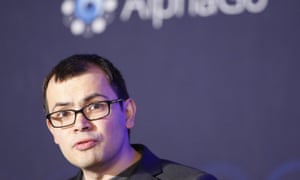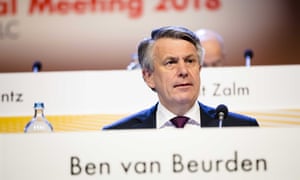Bilderberg 2018: new tech helps oil the wheels of the global elite
Secretive meeting in Turin embraces AI and Silicon Valley with globalisation under threat
This year’s Bilderberg conference has begun in Turin, and as well as billionaires and bank bosses the attendees include four prime ministers, two deputy prime ministers, the Nato secretary general, the German defence minister, the king of the Netherlands and the indefatigable 95-year-old Henry Kissinger.
Like Kissinger, Bilderberg shows no signs of slowing down or complacency. Its recent flirtation with artificial intelligence and Silicon Valley seems to have blossomed into a full-blown affair. This year a Twitter board member, Patrick Pichette, has got the nod, and returning for the second time is Divesh Makan, who has links to Mark Zuckerberg and whose clients include Reid Hoffman, the LinkedIn co-founder and Bilderberg veteran.
With AI high on the agenda, Demis Hassabis, who runs Google’s London-based DeepMind project, has also been invited back. He will be joined by his fellow AI luminary Hartmut Neven, the head of Google’s Quantum Artificial Intelligence lab.
The guest list also features researchers from the fields of biotech, robotics, stem cell research and human-machine bio-integration.
It means the conference has both a futuristic feel and a nostalgic air, with “quantum computing” on the agenda alongside “US world leadership” and “Russia”. So even as Bilderberg races into a bio-integrated smart future, there is a simultaneous resurgence of one of the group’s traditional power cliques: big oil. Royal Dutch Shell is represented in Turin by its chief executive, Ben van Beurden, and the French oil and gas giant Total has sent its chairman and chief executive, Patrick Pouyanné, who will be welcomed to the conference by the Bilderberg insider and Total board member Patricia Barbizet.
Sitting alongside Barbizet on Bilderberg’s steering commitee is the BP director Sir John Sawers. The former head of MI6 has this year invited BP’s chief financial officer, Brian Gilvary, who can chat about fracking with Dambisa Moyo, a director at Chevron.
The veins of Bilderberg run with oil, and its beating heart is the Dutch royal family and its oil interests. The founding president of the group was Prince Bernhard, the grandfather of the current king, Willem-Alexander. In his inaugural speech at the first conference in 1954, Bernhard set out the purpose of Bilderberg: “Because the free countries of Europe, the United States and Canada must act as a unit, they must try to think the same way. This is a long-term process.”
Out of this consensus emerged the EU, for decades nurtured around the Bilderberg conference table. And yet now, as they stand on the brink of a brave new algorithmic age, everything they have worked so hard to achieve is under threat.
At the top of the conference agenda are the dire words: “Populism in Europe.” The EU, already given a black eye by Brexit, is facing another thumping from Italy’s populist coalition, and the transatlantic alliance is groaning under the strain of Trump. Which is why Turin is the perfect choice for the 2018 summit.
The city is the spiritual home of Fiat and the Agnellis: the flamboyant Gianni Agnelli was a mainstay of Bilderberg throughout the last few decades of the 20th century, and a close friend of Kissinger (not, in this instance, a euphemism). His grandson, John Elkann, runs Exor, the holding company for the Agnelli billions, and sits on Bilderberg’s steering commitee.
Agnelli attended 37 conferences: his spirit will loom large over the Turin gathering, which is being held at the old Fiat HQ. It offers a chance for Bilderberg to reflect on its past, remember its victories and gather courage, so that it can hurl itself back into the battle for globalisation.
Also at the conference will be George Osborne, who was recently given a job at Exor, chairing a council of business advisers. The Evening Standard editor has recently been criticised for allegedly selling positive news coverage to big business. Is Osborne going to be inking some juicy cash-for-content deals in Turin? Or might he grit his teeth and report on what is discussed?
Of course, Osborne is not the only representative of the media at Turin. In fact it is a bumper year for journalists: there are columnists, editors, TV anchors, from the editor-in-chief of Bloomberg to the president of Turner International. Elkann is on the board of the Economist Group (Exor has the majority share).
Scratch an industrialist at Bilderberg and you will find a media magnate. Antti Herlin, the Finnish delegate who runs Kone Corporation – “a global leader in the elevator and escalator industry” – also happens to be the vice-chair of the company that owns the daily newspaper Helsingin Sanomat.
And yet with all these media representatives, we will learn little of what is said in Turin.






Geen opmerkingen:
Een reactie posten